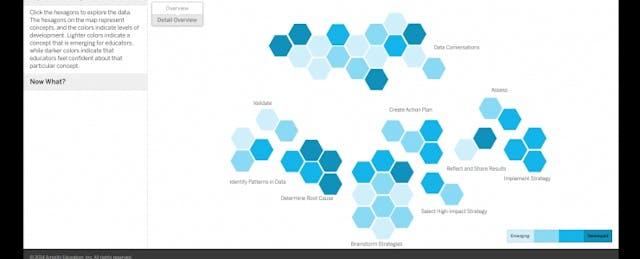Education technology and data analytics go hand in hand. But in order for these tools to help inform teachers with their instructional practice, they need to understand how to use the data generated about where students are excelling and struggling.
This week, Amplify is offering a professional development (PD) tool, dubbed “Professional Learning Maps,” to help teachers hone their data skills.
It’s the latest in a series of personalized software developed by the company owned by News Corp and headed by former New York City Schools Chancellor Joel Klein. Best known for its all-in-one instructional tablet designed for the classroom, the company has also developed curriculum for students and formative assessment tools which create a heat map of skills that they’ve mastered and those that need more practice.
“[Through this work] we heard a lot of questions from teachers. They’d say, ‘Your software for students is great, but what do we do next with the data?’” says Senior Vice President and General Manager of Professional Services, Leslie Kerner, an 11-year veteran at Amplify (formerly known as Wireless Generation).
With Professional Learning Maps, a web-based platform, Amplify takes a similar data-driven approach to help teachers drive their own learning.

Teachers start with a diagnostic survey, which asks them to agree or disagree on 106 statements about how they use data in their classrooms. Based on their responses, the survey generates a hexagonal map of 51 skills, color-coded to represent areas--such as identifying patterns or data conversations--that teachers are least or most confident at.

Teachers can click on any hexagon to access tutorials created by the Amplify professional services team. Each tutorial includes videos, objectives and opportunities to practice data collection or analysis skills. For example, teachers might be asked to use a set of data to create heterogeneous groupings of students to practice identifying patterns in data.
After completing these exercises, teachers take a quiz to see what they’ve mastered and then asks them to apply what they know through suggested activities to perform in their classrooms.
Once they’ve passed the quiz, the color on their map changes and they move onto their next skill of choice. Teachers are encouraged to take the survey two to three times a year to regenerate their revised map.
While administrators can’t see individual teacher data, they can see an aggregate view of all the teacher’s data combined. Amplify has intentionally given teachers control of their own data, allowing them to determine who and when they share their map with others. “We feel seriously that this is a formative assessment and not a teacher evaluation tool,” says Kerner.

The tool also provides tutorials to teach administrators how to support teachers in acquiring these skills. These include facilitator guides and digital resources that explain each skill, how to teach them and templates for in-person PD activities. In the professional development arena, where administrator support is so often overlooked and usually is limited to observation or evaluative tools, this offers a unique approach to keeping the administrator involved.
While this is Amplify’s first tool for teachers, the company is no stranger to the professional development world. Over the past 10 years, Amplify has been facilitating in-person workshops and coaching sessions on helping teachers use data to drive instruction. The company has 150 employees in its professional services division.
As Amplify refines the tool, it plans address other skills such as parent communication or math instruction.
So far, the tool has been beta tested in 147 schools in 39 different districts across New Mexico, Mississippi, Alabama, Colorado, Arkansas, Delaware, Illinois, and Utah. Today, the company is making the tool available directly to schools and districts for a site license fee of $4,000 per school or $1,000 for a month trial.
For a tool focused on personalized learning by giving teachers their own data and empowering them to choose what they’d like to learn, it may be surprising that they currently don’t have the option to purchase the tool themselves.
“We entered the market with a school or district purchasing model because we know there’s a systematic need for the product and its how our customers wanted to access the tool. That’s not to say we won’t ever sell direct to teachers - we are investigating more of an app model,” says Kerner.


